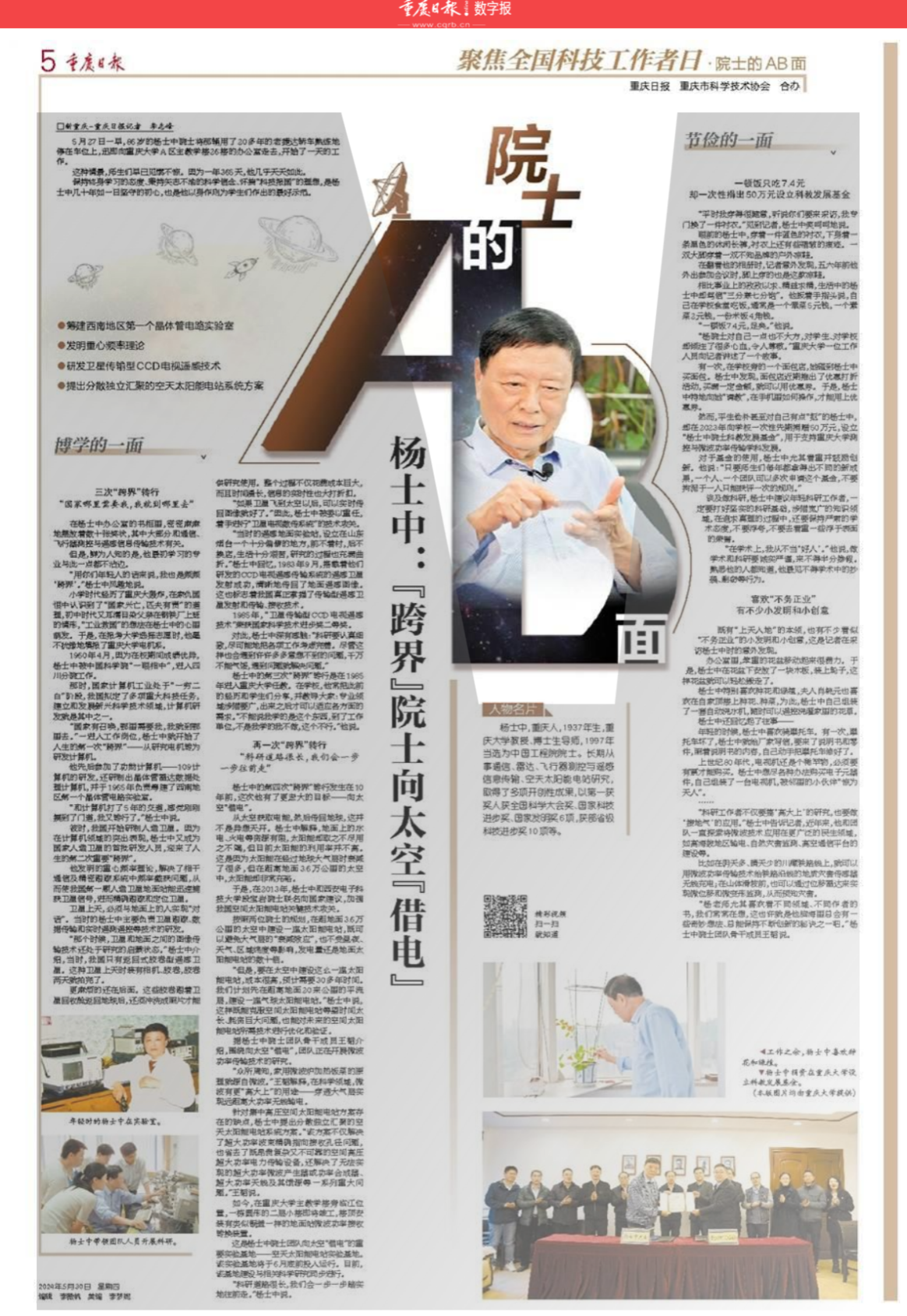
On May 30, when the 8th "National Science and Technology Workers' Day" took place, Chongqing Daily featured "All About Academician," a full-page story on the touching stories of Academician Yang Shizhong of CQU in scientific research and daily life. The full text is as follows:
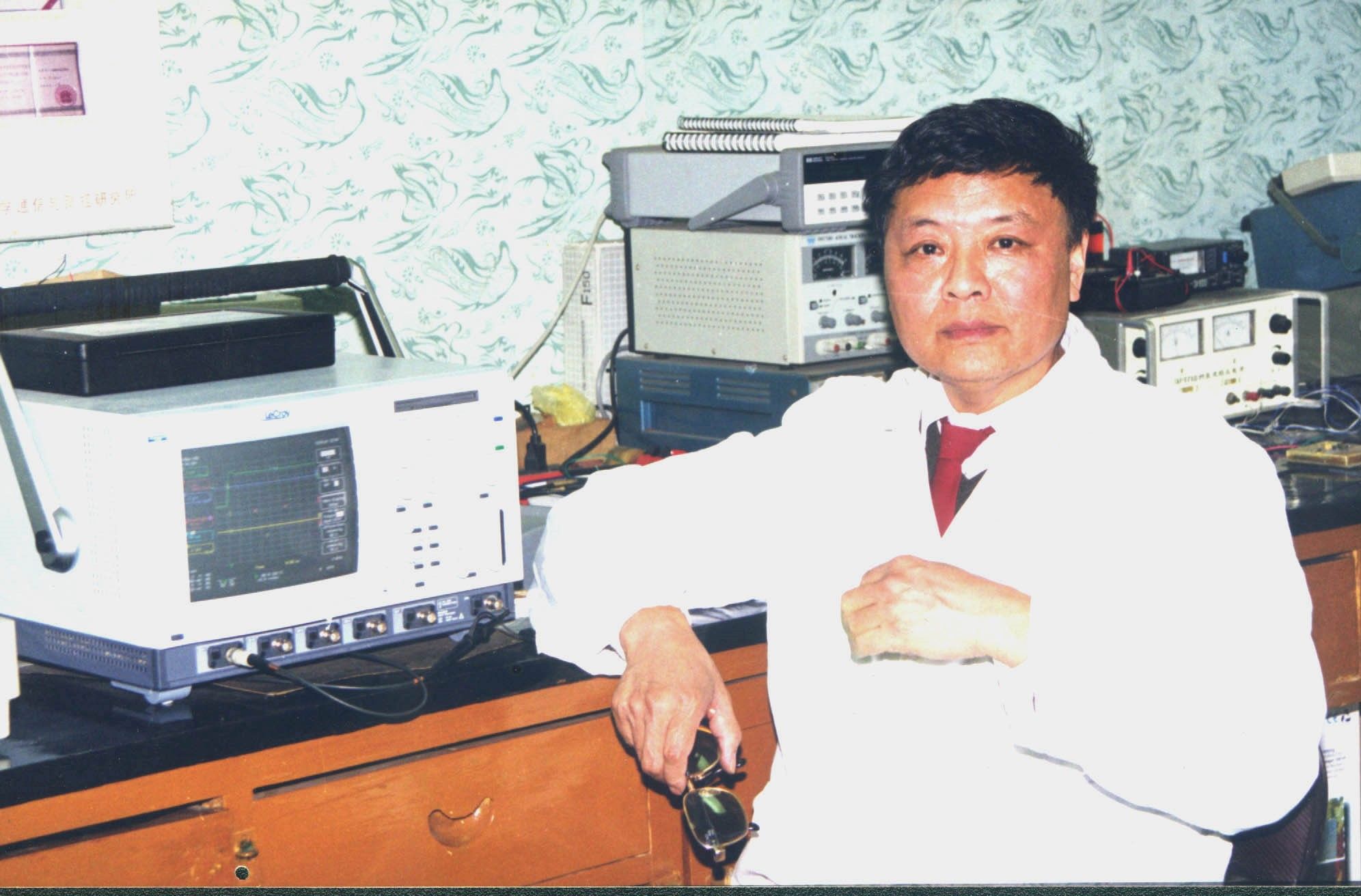
Young Yang Shizhong in the lab
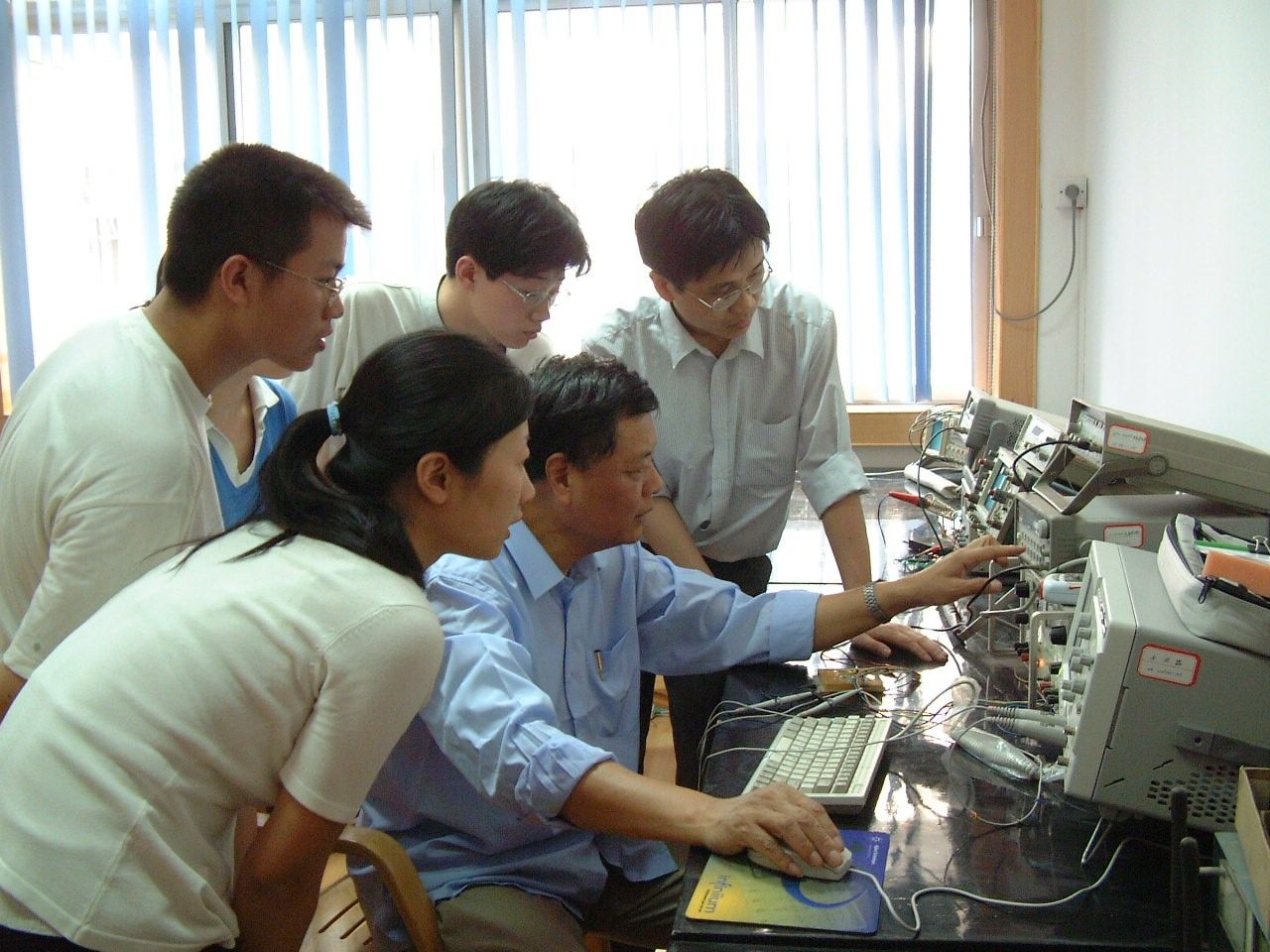
Yang Shizhong leads his team in scientific research
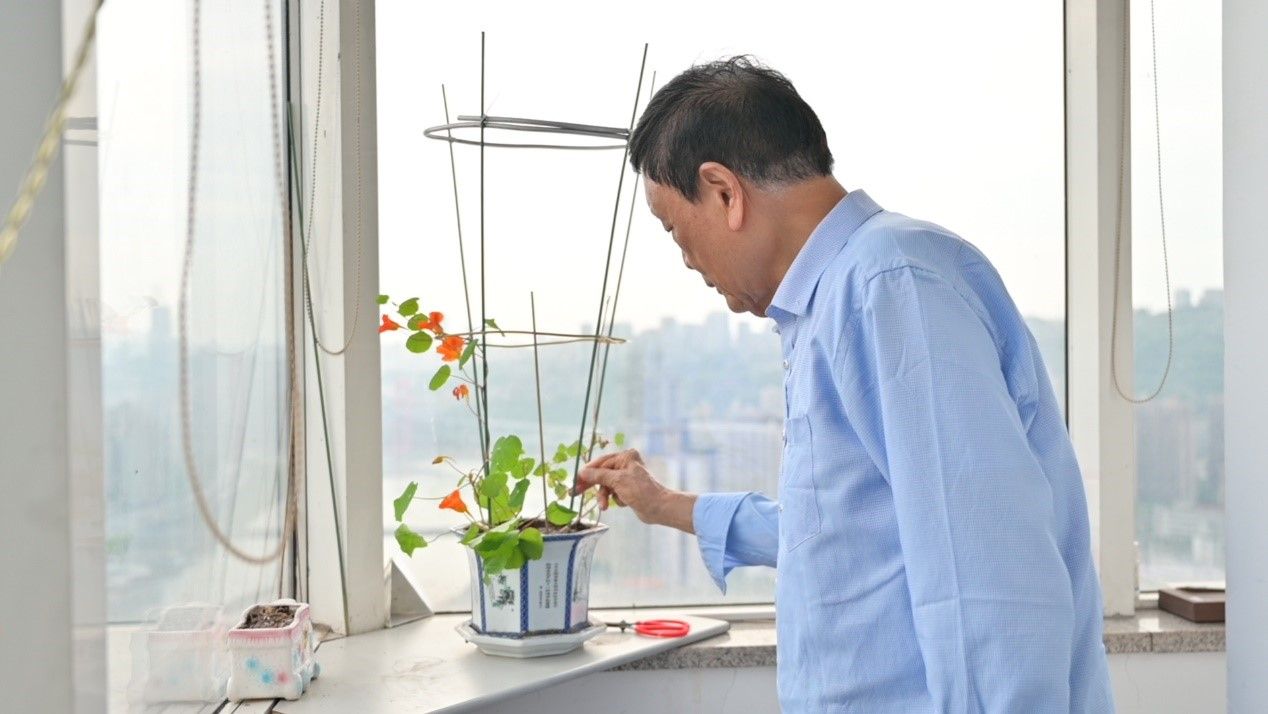
Yang Shizhong enjoys his spare time with flowers and green plants
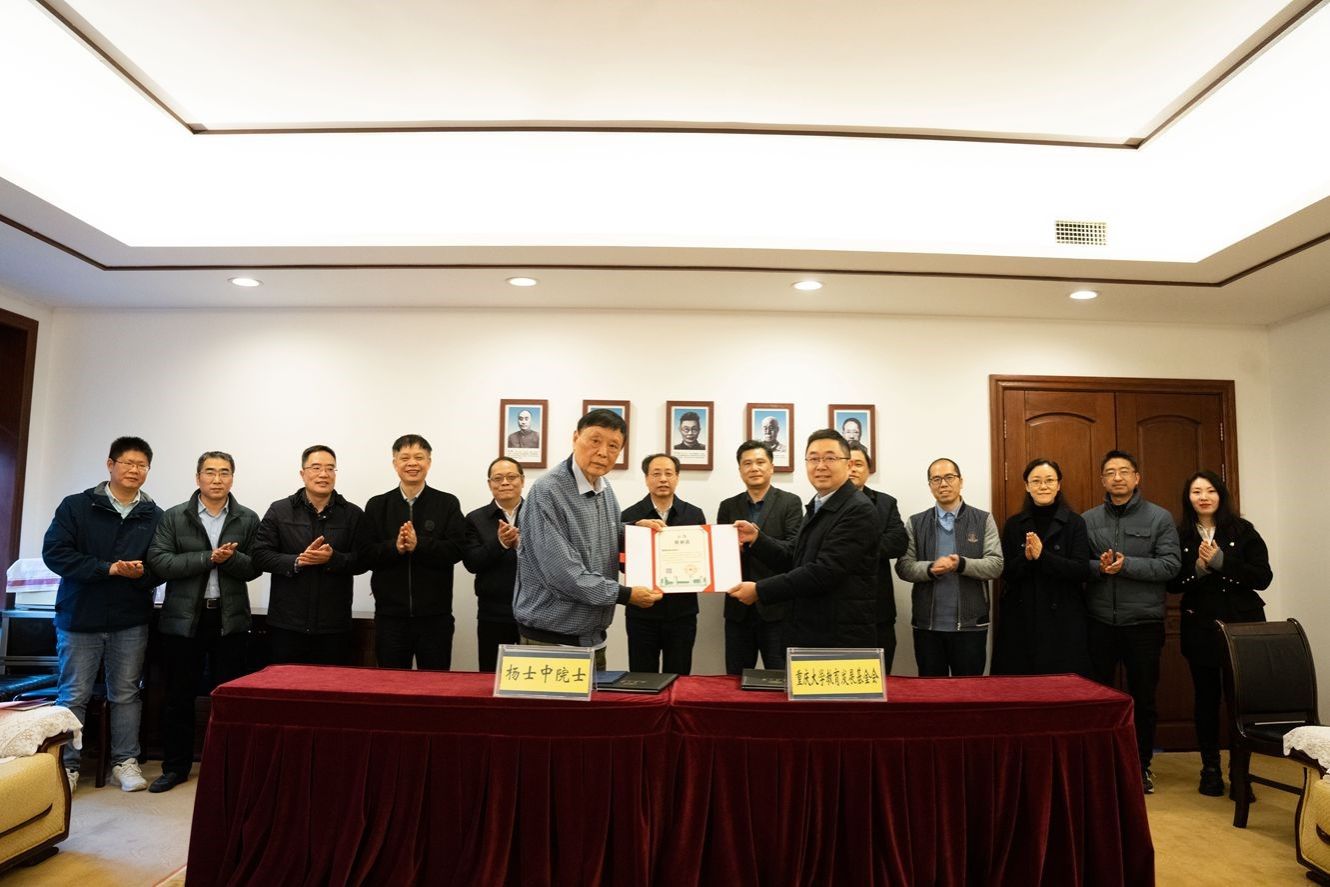
Yang Shizhong donates to establish Science and Education Development Fund at CQU
About the Interviewee
Yang Shizhong, a native of Chongqing born in 1937, is a professor and doctoral supervisor at CQU, and was elected as an academician of the Chinese Academy of Engineering in 1997. He has long been engaged in the research of communication, radar, aircraft measurement and control and remote sensing information transmission, and solar power satellite, and has produced a multitude of pioneering achievements. He was awarded the National Science Conference Award as the first winner. He was recipient of State Science and Technology Progress Award and State Technological Invention Award for 6 achievements, and won 10 ministerial and provincial science and technology progress awards, among other awards.
In the early morning of May 27, 86-year-old academician Yang Shizhong parked proficiently the old Jetta sedan, which had been used for over two decades, and hurriedly made his way to the office on the 26th floor of the main teaching building at Area A of CQU to start his day's work.
This is a scenario that his colleagues and students have been used to for a long time. He does it almost every day throughout the year.
He has always been committed to his original aspiration of "keeping learning for a lifetime, believing in scientific pursuits and serving the country with science and technology." This is also the best example he can set for his students.
Prepared for the establishment of the first transistor circuit laboratory in Southwestern China
Invented the gravity frequency theory
Developed satellite transmission-based CCD TV remote sensing technology
Proposed a decentralized and independent convergence system for solar power satellite
Showcasing versatile expertises
Job changes three times
"I proactively respond to the call of the country and serve the country wholeheartedly."
In the bookcase of Yang Shizhong's office lie dozens of honorary certificates, most of which are related to communications, aircraft measurement and control and remote sensing information transmission technology.
However, it is not well known that he initially studied a profession that had nothing to do with these at all.
"To put it in the words of you young fellas, I'm a cross-over veteran," Yang Shizhong said interestingly.
In his elementary school years, he witnessed the Bombing of Chongqing and realized the truth that "survival of a nation is the responsibility of every individual" amidst national enmity and family hatred. In his junior high school years, his father worked for a steel plant, which inspired the idea of "saving the nation by engaging in industry" in Yang Shizhong's mind. He therefore made up his mind without hesitation to file the intention to be admitted by the Electrical Engineering Department of CQU.
In April 1960, Yang Shizhong was admitted to the Sichuan Branch of the Chinese Academy of Sciences (CAS) due to his excellent academic performance during his college years.
To address the backwardness of the Chinese computer industry, China formulated a dozen major scientific and technological missions to establish and develop new scientific and technological sectors, including computer R&D.
"I proactively respond to the call of the country and serve the country wholeheartedly." As soon as he started his career, Yang Shizhong completed his first job change from researching electric motors to developing computers.
He successively participated in the research and development of the model 109 computer and developed the transistorized radar data-processing computer. In 1965, he was assigned the responsibility of preparing for the establishment of the first transistorized circuits laboratory in Southwestern China.
"Although the five-year engagement with computers enabled me to delve into the world of computers, I change my job," Yang Shizhong said.
At that time, China began to develop artificial satellites. Thanks to his outstanding performance in the field of computers, Yang Shizhong joined the first batch of researchers and developers of national artificial satellites, marking the second important "cross-over" in his life.
The gravity frequency theory invented by him addressed the problem of frequency interception in coherent communication and precision tracking system, thus enabling the ground station of the first artificial satellite in China to rapidly capture satellite signals and then accurately track and locate satellites.
To launch satellites into space, it is imperative for satellites to "talk" with people on the ground. At that time, Yang Shizhong was primarily responsible for the research and development of satellite tracking, data transmission and real-time telemetry and telecontrol technologies.
"At that time, the technology of image transmission between satellites and the ground was at the infancy of research." According to Yang Shizhong, at that time, China could only deploy recoverable film-type remote sensing satellites. This kind of satellite was equipped with cameras and roll films, and the films were finished in two days after launching of this kind of satellite.
Beyond that, more problems followed. These films had to be developed into photographs for research purposes after they were returned to Earth in the satellite's recovery capsule. The whole process was not only costly, but also lengthy, compromising the real-time availability of information.
"It would be great if the satellite could send back images in real time after it was sent into space." Therefore, Yang Shizhong was entrusted with the important task of working on the technical research of "satellite TV digital transmission system."
"The remote sensing ground experiment station was established at a very isolated place in Yantai, Shandong Province, without adequate research and living resources, making it a very difficult for doing research at that time." Yang Shizhong recalled that in September 1983, the remote sensing satellite carrying the CCD TV remote sensing transmission system developed by his team was successfully launched, with clear ground remote sensing images received. This also marked China's true mastery of transmission-type remote sensing satellite launch as well as transmission and reception technology.
In 1985, the satellite transmission-type CCD TV remote sensing technology was awarded the second prize of State Science and Technology Progress Award.
Yang Shizhong was deeply touched by this and said "Scientific research should be conducted in a serious and meticulous manner, and every effort should be made to optimize everything as much as possible. Despite of countless encounter unexpected problems, we didn't quit. Instead, we faced up to these problems and solved them."
Yang Shizhong's third "cross-over" career change happened in 1985 when he joined CQU as a faculty member. During his time at CQU, he often shared his previous experience with students and taught them that they should diversify their field of specialization so that they could fit in with the needs in all areas when they graduated. "It is not acceptable that graduates work at the workplace irrelevant to their original specialty," he said.
Another "cross-over" career change
"As it takes great efforts in scientific research, we will march forward step by step."
Yang Shizhong's fourth "cross-over" career change occurred 10 years ago, when he had a more ambitious goal to "borrow electricity" from outer space.
Getting electricity from outer space and then transmitting it back to Earth is not fantastical. Yang Shizhong clarified that while resources such as hydropower and thermal power on the ground are limited, solar energy is inexhaustible. Yet the utilization rate of solar energy is presently modest. This is because solar energy is attenuated a lot when it passes through the Earth's atmosphere, but solar energy is abundant in outer space, which is 36,000 kilometers from the ground.
For this reason, in 2013, Yang Shizhong, in association with academician Duan Baoyan of Xidian University, submitted a proposal to the central government to strengthen the key technology research of China's solar power satellite.
According to the planning of the two academicians, the building of a solar power satellite 36,000 kilometers from the ground would obviate the "attenuation effect" of the atmosphere and eliminate the effects of day and night, weather, and regional latitude, with power capacity tens of times that of terrestrial solar power stations.
"However, it would be costly to build such a solar power satellite, which is expected to take more than 30 years. We plan to first build a balloon solar power station in the stratosphere, 20 or so kilometers from the ground." Yang Shizhong said that this project could not only overcome the problem of long waiting time and huge cost of space solar power station, but also optimize and validate the technology required for the future space solar power station.
According to Wang Tao, a key member of academician Yang Shizhong's team, the team is carrying out research on microwave power transmission technology around "borrowing electricity" from outer space.
"As we all know, the principle of heating meals in a household microwave oven originates from microwaves." Wang Tao explained, in the field of science, microwave has a "high-profile" use of penetrating the atmosphere to realize long-distance high-power wireless power transmission.
To address the shortcomings of the centralized high-voltage space solar power station program, Yang Shizhong proposed a decentralized and independent convergence system for solar power satellite. "This program addresses the problem of ultra-high-power beams pointing precisely to the receiving aperture, eliminates costly, complicated and unreliable space high-voltage ultra-high-performance power transmission equipment, and resolves a series of major problems such as the inability to deploy ultra-high-performance microwave generator or power synthesizer, ultra-high-performance antennae and their feed sources," said Wang.
A riverside two-story dome building is about to be completed next to the main teaching building of CQU, with a similar pot cover installed on the roof of the ground station microwave power receiving and converting device.
This is the solar power satellite experimental base, a key experimental base for academician Yang Shizhong's team to "borrow electricity" from outer space. The experimental base will be put into operation by the end of June. At present, base construction and related scientific research are proceeding in tandem.
"As it takes great efforts in scientific research, we will march forward step by step," said Yang.
Living a thrifty life
He spent only 7.4 yuan on a meal.
He donated a one-off sum of 500,000 yuan to set up a science and education development fund.
"Usually, I dress casually. However, I had a shirt exclusively for the scheduled interview." Yang Shizhong said smilingly when he saw the interviewer.
For this interview, Yang Shizhong was wearing a blue shirt with some wrinkles, a pair of black casual pants, and unknown outdoor sandals for his big feet.
When looking through his photo album, the reporter accidentally noticed that he wore the same sandals on his feet when he attended a conference five or six years ago.
He is an ambitious and dedicated expert in his career, but Yang Shizhong lives a thrifty lifestyle. He wiggled his fingers and said that he usually dined at the CQU cafeteria for 5 yuan on a meat dish, 2 yuan on a veggie dish, and 4 jiao on a serving of rice.
"A meal that costs 7 yuan 4 jiao is enough," said Yang.
"Academician Yang is not generous to himself at all, but he devotes a lot of effort to his students and CQU, earning a lot of respect," a staff member of CQU told a story to the reporter.
Once, she encountered Yang Shizhong shopping for bread at a bakery next to CQU gate. Yang Shizhong noticed that the bakery recently launched a discount campaign, which allows you to use coupons when you pay at a threshold. So, Yang Shizhong purposely ask her to "teach" him how to operate in the smart phone to use the coupon.
Despite being frugal and even a bit "niggardly," Yang Shizhong donated a one-off sum of 500,000 yuan to CQU in 2023 to set up the "Academician Yang Shizhong Science and Education Development Fund," which is intended to support the development of the measurement and control and microwave power transmission disciplines of CQU.
For the use of the fund, Yang Shizhong especially valued and encouraged innovation. He said, "As long as the faculty members and students produce different innovations every year, an individual or a team is eligible to apply for this fund several times, without being confined to the rule that one individual/team can only be honored once."
On doing scientific research, Yang Shizhong advised young research workers to build a solid foundation for scientific research, explore a wide range of knowledge areas, maintain a serious academic attitude in the pursuit of truth, and refrain from being pompous and valuing accolades.
"I have never been a 'nice guy' when it comes to academics." He stated that doing academic work and scientific research requires honesty and discipline, and that there is no room for adulteration. People who are familiar with him know that he detests plagiarism in academics.
He enjoys his spare time.
He has created quite a few inventions and ideas.
To the reporter's surprise in the interview with Yang Shizhong, Yang not only excels in his reserach interests, but also enjoys creating some inventions and ideas during his spare time.
In consideration of the heavy and bulky flower pots in the office, Yang Shizhong placed a wooden board under the flower pots and installed wheels so that the flower pots can be easily moved.
Yang Shizhong is particularly fond of planting flowers and green plants, and his wife, Xiao Taoyuan, also enjoys planting flowers and vegetables on the top floor of his house. For this reason, Yang Shizhong assembled a set of automatic watering machine by himself, so that he can remotely water the flowers and plants in his house at any time.
Yang Shizhong also recalled the past
When he was young, Yang Shizhong liked to ride a motorcycle. Once the motorcycle broke down, Yang Shizhong wrote a letter to the manufacturer to ask for the manual and parts, and fixed the motorcycle by himself according to the contents of the manual.
In the 1980s, television sets were still a rarity and you had to have a ticket to buy one. Yang Shizhong tried every possible way to buy electronic components and assembled a TV set by himself, making his neighborhood friends "amazed."
"Researchers should not only engage in 'high-profile' research, but also employ expertises for real-world benefits." Yang Shizhong told the reporter that in recent years, he and his team have been exploring the application of microwave technology in a wider range of people's livelihoods, such as power transmission at high altitudes, natural disaster monitoring, and the construction of overhead communication platforms.
For example, on the Sichuan-Xizang railway line, where there are many cloudy days and few sunny days, microwave power transmission technology can be used to wirelessly charge the geologic disaster sensors along the railway line; and displacement radar can also be used to achieve micro-displacement and micro-deformation monitoring before landslides to anticipate disasters.
"Mr. Yang especially prefers to read books in different fields and by different authors, and we often wondered if this might be one of the secrets of his ability to always get some marvelous ideas and to always keep innovating," said Wang Tao, a key member of Academician Yang Shizhong's team.
